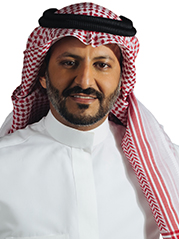The transformation of Saudi Arabia’s capital markets is advancing at a blistering pace. Today, the country’s equity and debt markets have shed the insular localism of their recent past and are gradually assuming both regional and global significance.
Mohammed El-Kuwaiz, the chairman of Saudi Arabia's Capital Market Authority (CMA), is responsible for much of this change. Under his leadership, the CMA has enacted far-reaching regulatory and structural reform to position Saudi Arabia as the de facto capital market for the wider Middle East region.
Governance improved
Riyadh’s leading financial sector executives are quick to point out Mr El-Kuwaiz’s achievements, which range from Saudi Arabia’s inclusion on various global emerging market indices to the introduction of a T+2 settlement cycle and the impending introduction of a central counterparty clearing house. For his part, Mr El-Kuwaiz is keen to emphasise the CMA’s progress on corporate governance standards in Saudi Arabia.
“[A lot] of the media coverage of Saudi Arabia internationally has focused on the opening up of the capital markets and the country’s inclusion in various emerging market indices. But I would say the most notable achievement is actually in the area of governance,” he says.
“Over the past two years, the CMA has published its first mandatory corporate governance code, which requires all publicly listed firms to offer electronic voting and electronic proxies, in addition to in-person attendance, at general assemblies. As a result, we have seen a fivefold increase in voting rights being exercised. We also became the first body in the kingdom to enable class action lawsuits.”
The CMA’s efforts in this domain have not gone unnoticed. Saudi Arabia has jumped up the league tables with respect to its corporate governance standards and is now firmly situated among the world’s leading jurisdictions based on relevant governance metrics.
“On the World Economic Forum’s global competitiveness index, Saudi Arabia has jumped from 77th to position five. The same is true for the World Bank’s Doing Business ranking [with respect to] the protection of minority investors. Saudi Arabia was 63rd in this category and today it is number seven in the world. Saudi Arabia has one of the most well-regarded governance systems in the world. That’s an important component for introducing yourself to an international audience,” says Mr El-Kuwaiz.
Fintech initiatives
Meanwhile, Mr El-Kuwaiz and the CMA are pushing ahead with plans to enhance Saudi Arabia’s fintech sector. In 2018, the CMA became the first public agency to launch a regulatory sandbox for fintech firms. This groundbreaking move saw the CMA issue two financial technology licences to crowdfunding entities.
“When we first launched the programme, we didn’t know what to expect. We had no real sense of the degree of appetite to license new and entrepreneurial ventures in the capital markets space. But we were positively surprised with the amount of interest that was generated,” says Mr El-Kuwaiz.
At the end of 2018, the CMA opened up the sandbox to a second cohort of fintech operators, receiving three to four times as many applications. Moving forward, the CMA is now co-operating with the Saudi Arabian Monetary Authority (SAMA) on the development of a wider initiative to support early stage fintech groups in the country.
“We recognise that, in addition to our role as regulator, there needs to be an incubator or facilitator for these early-stage fintech groups. As a result, we are working with SAMA on a pan-financial sector initiative to incubate businesses up to the point where they receive a sandbox licence. We found that a lot of these businesses require support to develop their business model. I imagine we would want to set that up in the next few months,” says Mr El-Kuwaiz.
These initiatives, and others, are contributing to the maturation of Saudi Arabia’s capital markets. Situated within the wider landscape of the country’s Vision 2030 development objectives, the CMA – under Mr El-Kuwaiz’s leadership – has earned plaudits for enacting genuine change, even as other elements of this agenda have stalled.
The reforms being made by the CMA today will be crucial as Saudi Arabia attempts to move beyond its oil-dependent economic model. Stimulating non-oil private sector activity and greater foreign direct investment will depend on having well-regulated and efficient capital markets. In this respect, the CMA is meeting, and often exceeding, its obligations under the country’s reform agenda. The time has come for other institutions to follow suit.












